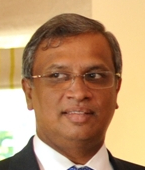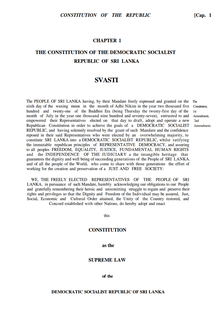Politics of Sri Lanka takes place in a framework of a semi-presidential representative democratic republic, whereby the President of Sri Lanka is both head of state and head of government, and of a multi-party system. Executive power is exercised by the government. Legislative power is vested in both the government and Parliament. For decades, the party system has been dominated by the socialist Sri Lanka Freedom Party and the conservative United National Party. The Judiciary is independent of the executive and the legislature. The Politics of Sri Lanka reflect the historical and political differences between the three main ethnic groups, the majority Sinhala and the minorities Tamils and Muslims, who are concentrated in the north and east of the island.

Ranil Wickremesinghe MP is a Sri Lankan politician who is the current Prime Minister of Sri Lanka, and has served as Leader of the United National Party since 12 November 1994. He was first elected Member of Parliament (MP) for Biyagama in 1977

The United National Party, often abbreviated as UNP, is a political party in Sri Lanka. It currently is the main ruling party in the government of Sri Lanka and is headed by Ranil Wickremesinghe. The UNP is considered to have right-leaning, pro-capitalist, and liberal conservative policies.

The Parliament of the Democratic Socialist Republic of Sri Lanka is the supreme legislative body of Sri Lanka. It alone possesses legislative supremacy and thereby ultimate power over all other political bodies in the island. It is modeled after the British Parliament.

Deshabandu Karu Jayasuriya, MP is a Sri Lankan politician and statesman. He is the current Speaker of the Parliament of Sri Lanka. Previously he was Mayor of Colombo from 1997 to 1999, Minister of Power and Energy from 2001 to 2004, Minister of Public Administration and Home Affairs from 2007 to 2008, and Minister of Buddha Sasana, Public Administration, and Democratic Governance in 2015. He has served as Chairman of the Leadership Council of the United National Party (UNP), as well as Deputy Leader of the UNP. He is a Member of Parliament representing the Gampaha District since 2001. He had served as Sri Lanka's Ambassador to Germany. As Speaker of Parliament, he also acts as Chairman of the Constitutional Council.
The Cabinet of Sri Lanka is the council of ministers that form the central government of Sri Lanka. It is responsible to and answerable to parliament. The current cabinet is the Sirisena cabinet.

The Speaker of the Parliament of the Democratic Socialist Republic of Sri Lanka is the presiding officer of the chamber. The current Speaker of the Parliament is Karu Jayasuriya, in office since 1 September 2015. The Speaker fulfills a number of important functions in relation to the operation the House, which is based upon the British Westminster Parliamentary system.

Pallewatte Gamaralalage Maithripala Yapa Sirisena is a Sri Lankan politician, the seventh and current President of Sri Lanka, in office since 9 January 2015. Sirisena is Sri Lanka's first president from the North Central Province of the country and does not belong to the traditional Sri Lankan political elite.

Mathiaparanan Abraham Sumanthiran is a Sri Lankan Tamil lawyer, politician and Member of Parliament.

Dinendra Ruwan Wijewardene is a Sri Lankan politician, He is the current State Minister of Defence & Mass Media non-cabinet Minister, Member of Parliament for Gampaha District and the United National Party (UNP) chief organiser for Biyagama Electorate. Prior to entering parliament in 2010, he was a member of the Western Provincial Council. He was appointed as the acting minister of defence few times after 2019.

Vasudeva Nanayakkara is a veteran left-wing Sri Lankan politician, Member of Parliament and a former presidential candidate.
The 12th Parliament of Sri Lanka was a meeting of the Parliament of Sri Lanka, with the membership determined by the results of the 2001 parliamentary election held on 5 December 2001. The parliament met for the first time on 19 December 2001 and was dissolved prematurely on 7 February 2004.

Rajapakse Mohottige Don Suranimala Rajapaksha was a Sri Lankan politician. Rajapaksha was first elected to the Parliament of Sri Lanka in 1994 and he was the Minister of School Education in Democratic Socialist Republic of Sri Lanka in 2001 to 2004. He is a member of the United National Party (UNP) and a member of UNP Working Committee. He was also appointed as the Coordinating secretary to the Prime Minister Ranil Wickremasinghe in 2015. At the time of his death he was acted as the special envoy (representative) to the Prime Minister. His younger son Kanishka Rajapaksha is also appointed as the Coordinating Assistant to the Prime Minister after the death of Rajapaksha. Kanishka is an Attorney at Law in his profession.

The 2015 Sri Lankan parliamentary election was held on 17 August 2015, ten months ahead of schedule, to elect 225 members to Sri Lanka's 15th Parliament.
The 19th Amendment (19A) to the Constitution of Sri Lanka was passed by the 225-member Sri Lankan Parliament with 215 voting in favor, one against, one abstained and seven were absent, on 28 April 2015. The amendment envisages the dilution of many powers of Executive Presidency, which had been in force since 1978. It is the most revolutionary reform ever applied to the Constitution of Sri Lanka since JR Jayawardhane became the first Executive President of Sri Lanka in 1978.

The 15th Parliament of Sri Lanka is the current Parliament of Sri Lanka, with the membership determined by the results of the 2015 parliamentary election held on 17 August 2015. The parliament met for the first time on 1 September 2015. According to the Constitution of Sri Lanka the maximum legislative term of the parliament is 5 years from the first meeting.

Thenahandi Wijayapala Hector Mendis was a Sri Lankan politician and a member of the Parliament of Sri Lanka.

A constitutional crisis began in Sri Lanka when President Maithripala Sirisena appointed former president and member of parliament Mahinda Rajapaksa as Prime Minister on 26 October 2018 before formally dismissing the incumbent Ranil Wickremesinghe, resulting in two concurrent Prime Ministers. Wickremesinghe and the United National Party (UNP) viewed the appointment as illegal, and he refused to resign.
















